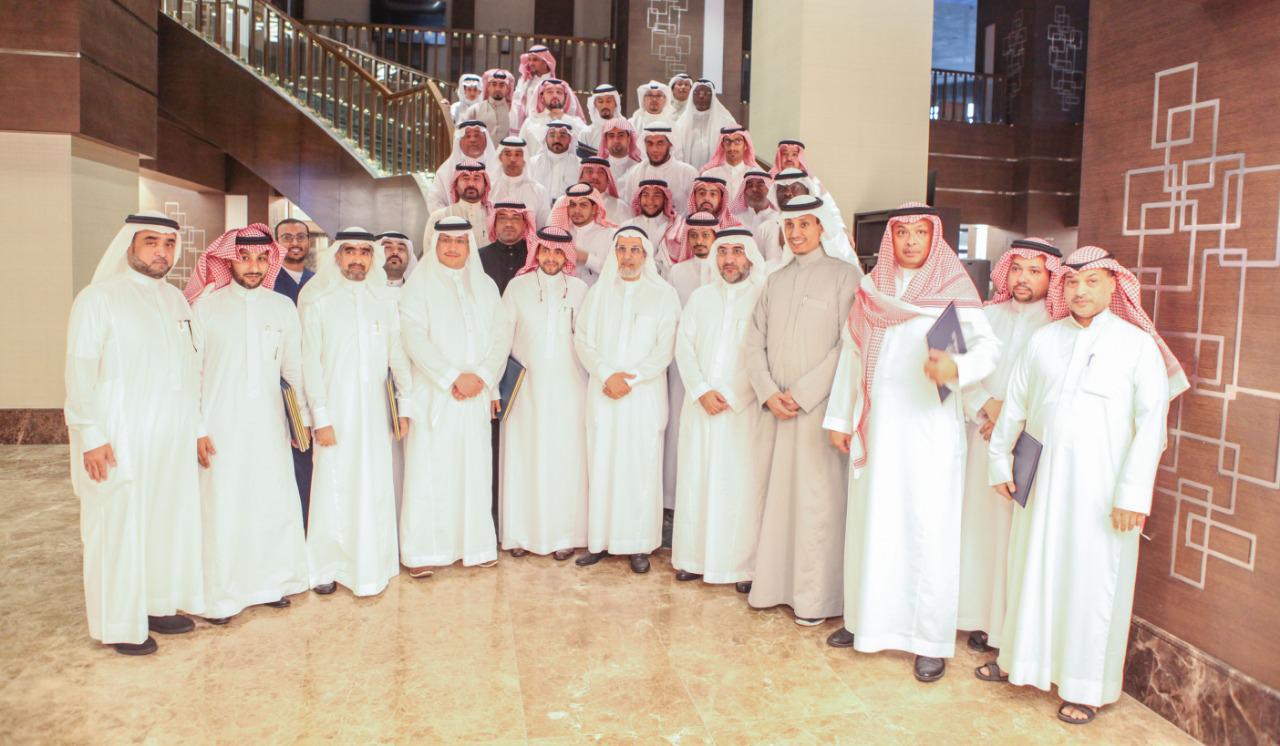Umm Al-Qura University
- University Vice-President

Under the patronage of his Excellency the President of Umm Al-Qura University, Prof. Abdullah bin Omar Bafail, the concluding ceremony of the training program for 90 employees was held. This program was organized by the Administrative Development Department in collaboration with the Business Center at the Institute of Public Administration in the western region during the period from 3 to 28 Rabi` Al-Awwal, 1440 A.H. His Excellency the Vice-President of the University, Dr. Yasser bin Sulaiman Shosho, and the Manager of the Works Center at the Institute of Public Administration, Makkah branch, Dr. Bandar bin Sulaiman Al-Wakid, attended the ceremony at the Four Points Hotel at Al-Naseem, Makkah.
At the beginning of the meeting, the Head of the Administrative Development Department, Mr. Walid Simbawah, welcomed His Excellency the President of Umm Al-Qura University, the honorable guests and the trainees. He asserted that such training programs are concerned with preparing and developing warehouses, controlling and storing materials, administrative investigations, and administrative control regulations. He added that these programs fall within the plan of the Administrative Development Department to develop the administrative personnel and make them acquire more skills in their field work.
Next, the trainees speech was delivered by the Head of the Follow-up Department, Mr. Sa`id Yamani, who pointed out that such programs had positive effects in improving the level of quality of the employees' performance and productivity on the long and short run, and in promoting their administrative, cognitive and scientific abilities and skills.
In this regard, the Business Center Manager at the Institute of Public Administration, Makkah branch, Dr. Bandar bin Salim Al-Wakid, stated that the Center, which was represented by the Institute, has established a strategic partnership with Umm Al-Qura University in training and consulting fields. He appreciated the keenness of Umm Al-Qura University on upgrading the level of the cognitive skills of its staff, and wished them success and progress.
On his part, the Vice-President of the University, Dr. Yasir bin Sulaiman Shosho, praised the care and support of his Excellency the President of Umm Al-Qura University for developing the human capabilities and the administrative entities through training the staff to use the most modern skills and professional practices that will have great positive effect on the research and academic environment.
He stated that out of keenness to reach the highest rates of professional performance, they made use of the experiences and efficient personnel available in the Business Center at the Institute of Public Administration to carry out this training program for 90 trainees from among the staff of the following departments: Follow-up Department, Warehouse Department, and Stored Items Monitoring Department. He wished them success in their work and hoped they would improve the quality of their performance during the coming period due to what they gained of skills during this program.
On his part, the President of Umm Al-Qura University, Prof. Abdullah bin Omar Bafail, congratulated the trainees for their success in the training program. Moreover, he praised the support that the wise government provides to the educational process, its research and administrative environment. He stressed his keenness on holding such training programs for all personnel in the University, hoping that their positive effect will affect the research, educational and developmental outcomes in order to keep pace with modern updates of regulations, bylaws and technological means.
His Excellency added that qualifying personnel from among the University staff springs from the need to prepare national cadres who are able to keep pace with the accelerating development that the Kingdom, may Allah maintain its security and stability, is witnessing. He stressed that the administrative development is considered to be a part of the University's strategic plan that keeps pace with the vision of the Kingdom of 2030. He hoped that such training programs will have a positive effect on the quality of performance, resulting in an improvement of the academic outcomes to meet the needs of the labor market.